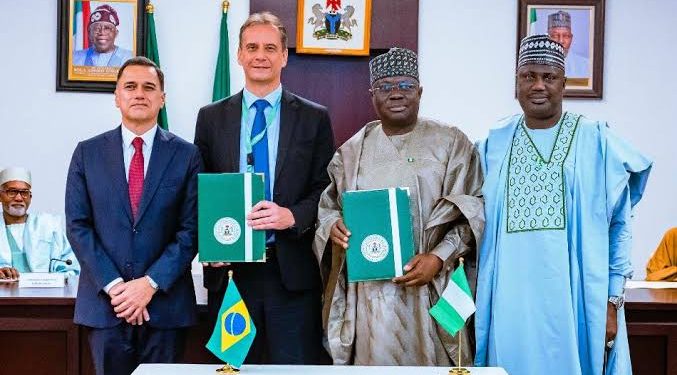Nigeria and Brazil have officially signed the commercial phase of the $1.1 billion Green Imperative Project (GIP), a landmark initiative aimed at revolutionizing Nigeria’s agricultural sector through large-scale investments, mechanization, and private-sector collaboration. The signing, which took place at the Presidential Villa in Abuja, marks a significant step in Nigeria’s efforts to boost food production and reduce reliance on imports.
The Green Imperative Project is the largest agricultural project in Africa and is part of a broader $8 billion initiative designed to develop sustainable, low-carbon agriculture. It is expected to modernize the sector by providing farmers with advanced machinery, improved techniques, and financial support to enhance productivity.
Vice President Kashim Shettima, who presided over the signing, described the project as a key element of President Bola Tinubu’s economic agenda, which prioritizes food security, job creation, and economic diversification. He emphasized that the GIP would leverage existing agricultural initiatives and serve as a catalyst for policy continuity, ensuring that small-scale farmers are integrated into national and global agricultural value chains.
“For decades, we have struggled with low agricultural productivity, but this initiative provides an opportunity to change that,” Shettima said. “Our people have the entrepreneurial spirit, but they need support to compete effectively. The GIP is a private sector-driven solution that directly empowers smallholder farmers and strengthens agricultural value chains.”
The Vice President commended the collaboration between the Federal Ministries of Agriculture, Finance, and Justice, as well as the Ministry of Foreign Affairs, in securing the agreement.
The Brazilian Ambassador to Nigeria, Carlos Garcete, noted that the project was the result of seven years of negotiations between both countries. He explained that the deal would enable the importation and local assembly of essential agricultural equipment, such as tractors and processing machines, which would be repaired and maintained locally by trained personnel.
“This is not just about importing machinery,” Garcete said. “It is about developing Nigeria’s agricultural sector with long-term sustainability. With this project, Nigerian farmers will have access to the tools and training needed to compete globally.”
Governors from various states, including Jigawa’s Umar Namadi and Benue’s Hyacinth Alia, hailed the agreement as a game-changer for food security. Governor Namadi noted that agriculture plays a critical role in Nigeria’s economy and that the GIP would help states maximize their agricultural potential.
Governor Alia, representing Benue, the country’s leading food-producing state, expressed confidence that the project would further enhance Nigeria’s food surplus. “Benue is not just the food basket of the nation—we hold the surplus that feeds millions. This project will ensure that our farmers get the support they need to produce even more,” he said.
The Minister of Foreign Affairs, Yusuf Tuggar, described the agreement as a strong example of South-South cooperation, emphasizing that Nigeria could learn from Brazil’s agricultural transformation, which turned vast savannah lands into highly productive farmland.
With the signing of this phase, implementation is expected to accelerate in 2025. The project will introduce mechanized farming on a large scale, reduce post-harvest losses, and create employment opportunities across Nigeria’s agricultural value chain. By providing financial and technical support, the GIP will also encourage private-sector participation, ensuring that Nigeria moves toward self-sufficiency in food production.
The Green Imperative Project represents a significant shift in Nigeria’s approach to agriculture, prioritizing sustainability, modernization, and private-sector engagement. If successfully implemented, it has the potential to transform Nigeria’s agricultural landscape, reduce food imports, and strengthen economic resilience.










